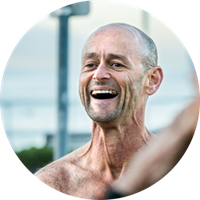Dexter's story video transcript
Dexter:
I get out of the house every morning to go somewhere near water. It's nice and fresh. The dawn's breaking. Other people are still in bed and I got the world to myself. I think it's just the connection with nature. When you're in the ocean, you're trusting the ocean to bring you back to the beach. I've always been a really big bike rider. It's always been really important to me since I was a kid. It was my freedom. It was my way of getting out and about.
Dexter:
When that car came at me, I only saw it about a second, two seconds before impact. It just swerved across the front of me. And the only thing that went through my head was this is going to be bad. I broke fibia, tibula, one of those, clean off, broke a bunch of bones at the bottom of my spine and my pelvis, and also my hip. And I smashed one ankle to pieces. So basically I had only one good limb. They told me it would take me at least a year to learn to walk again. I was in a lot of pain as well. I couldn't go to the bathroom. I couldn't go and get anything. I couldn't sit up for quite a long time. And that loss of function, that loss of autonomy, that was really hard. I knew all the way through that if anybody was going to recover, it was going to be me. I was very motivated to get back the function of my limbs so I could run, cycle, swim. All the things I love to do.
Dexter:
The Income Protection Plan really took a lot of stress off me. When I was trying to recover, all my energy was going into recovery. I really didn't want to stress about my financial situation. And that took that stress away. The people I've spoken to have been really kind, really helpful, really attentive. I hoped to get them to understand how determined I was to recover from this. And they got it straight away. They were like, "Oh yeah. Cool. We'll help you do that." It really did help that TAL understood what I was going through because when my friends came to visit me, they were all very lovely, but they hadn't got the faintest idea what I was going through.
Swetha:
When we're speaking to our customers, we try and take a holistic approach to everything that's going on in their lives. So it's important we understand that they're more than just their condition. It's about the support they have. It's about their perceptions around their ability to get back to work and everything else going on with them.
Swetha:
We recognised through conversations with Dexter, that being at work, was a very important part of who he was. So he identified that he was doing a lot of work from home. He was still struggling with pain and fatigue. We engaged with an occupational therapist who was able to support him with a workplace assessment and that involved looking at his workstation, making sure he was set up properly and then setting him up with a sit-stand desk and to help him work ergonomically correctly through the day. We also then engaged an exercise physiologist who was able to look at his function and support him with improving his strength and range of movement and management of fatigue overall.
Dexter:
It was really reassuring they had all the answers, that they had met so many people who'd had these experiences before and they knew how to deal with that. TAL gave me a lot of really practical support and they built a team around me to help me with my recovery in every way that I seemed to need it.
Dexter:
The accident and the whole long, painful recovery connecting with all of the people I've been around in the accident and since the accident has really changed the course of my life, in a good way. I think it's like many people who go into a high level of suffering, you get two choices. You can either get knocked down by it, or you can let it make you stronger.











